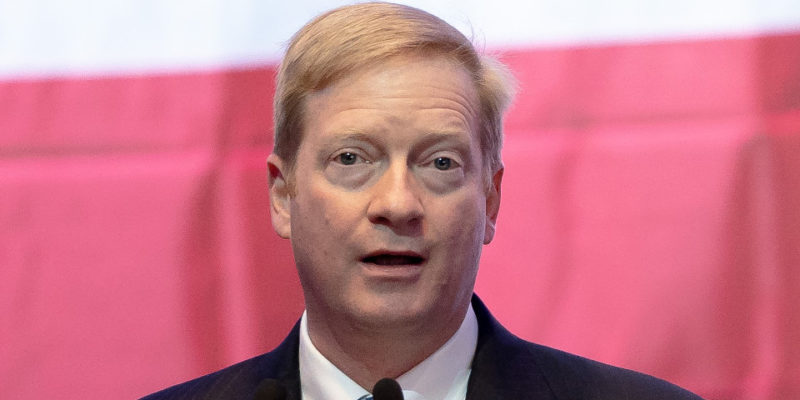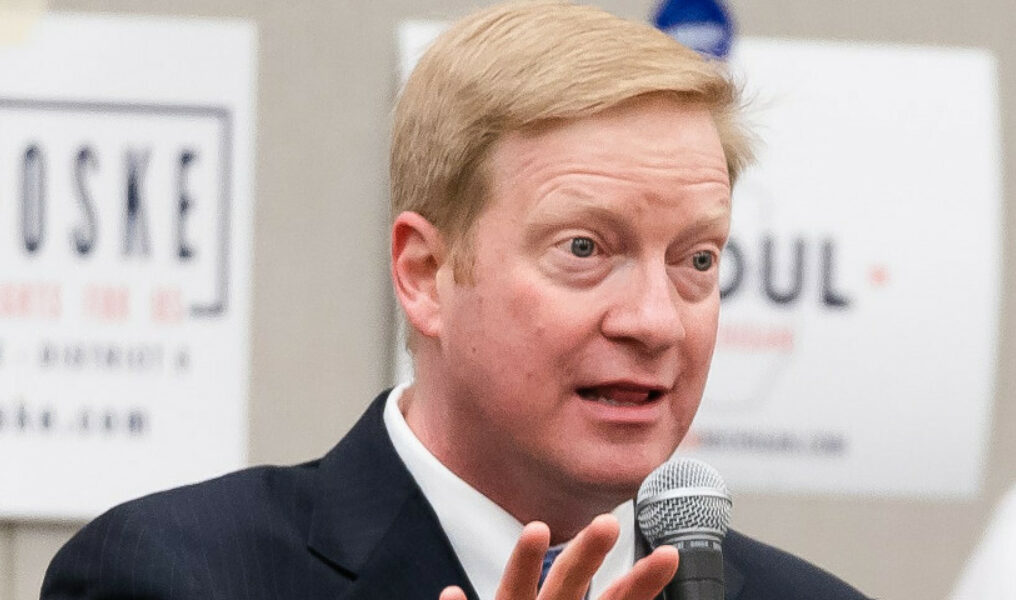Also, see our interview with other Michigan Supreme Court candidate Megan Cavanagh.
Considered by some to be the most important race for the people, the campaign for justice of the Michigan Supreme Court can often be overlooked when the public is particularly focused on the gubernatorial and congressional races. This year, two of the court's seven seats are up for consideration and following the November election, 25-year strong civil rights attorney Sam Bagenstos is hoping to fill one of them.
"Why people should care has really come into very sharp relief in the last few weeks as we've seen Donald Trump making his second appointment to the U.S. Supreme Court," he said referencing Brett Kavanaugh. "We have come to rely in the civil rights world on the federal courts as the place that we can go to enforce our basic rights, and I think we have to face the reality that – thanks to Donald Trump – the federal courts are going to be closed for business for the protection of our basic rights for the next generation. I'm not being hyperbolic here. I think that's really true. He's appointed a bunch of very young, very ideological judges to the lower courts. He's about to cement control of the Supreme Court with this second nomination."
And as this becomes an important moment for justice in America, the only place, according to Bagenstos, that people are going to be able to look for protections of their basic rights is to the state courts, and particularly the state Supreme Courts.
"I really do think this is a crucial moment for our state Supreme Court," he said. "We're at a crossroads about whether this is a court that can be counted on to fill the gaps created by a conservative dominated federal judiciary or not."
The current Michigan Supreme Court makeup is 5-2 with a Republican majority, four of whom were appointed by Gov. Rick Snyder, and one by former Gov. John Engler. Both Democrats, Bridget Mary McCormack and Richard Bernstein, were elected in 2012 and 2014, respectively.
The seven justices of the Michigan Supreme Court are chosen in nonpartisan elections and they serve eight-year terms and must be re-elected if they wish to continue serving. In the event of a mid-term vacancy, the governor appoints a temporary replacement to serve until the next general election.
"Justices seem to tend to time their departures so they leave when a governor of their party is in office. They leave before the end of their term so the governor can appoint someone with an incumbency advantage," Bagenstos said. "That's what happened here. The two people we're running against (Kurtis Wilder and Elizabeth Clement) are Snyder appointees who replaced Republicans who left in the middle of their term."
This year, Bagenstos is running with Megan Cavanagh.
"We have a chance to flip the Michigan Supreme Court this year with those two Snyder appointees up for election for the first time," he said. "If we take both of those seats then we can flip control of the court. It seems like an incredibly important moment to try to do that."
The Evidence
Bagenstos has built a reputation for defending workers' rights, protecting the right to vote, defending the rights of Americans with disabilities, fighting for women's rights and pursuing LGBTQ rights.
Since the beginning of his career, he has worked on LGBTQ cases, and as a young attorney, Bagenstos argued the precedent setting case Bragdon v. Abbott. In its first case addressing HIV, the U.S. Supreme Court ruled 5-4 that the federal Americans with Disabilities Act prohibits discrimination against people living with HIV, whether or not they show any visible symptoms or have an AIDS diagnosis.
Growing up, Bagenstos was raised by a single mother in the '70s and '80s who was involved in the feminist movement. He said that this was perhaps the reason that social justice issues have been important to him for a long time.
"I remember the time then when a lot of her friends came out, and hearing their stories of what it was like at a time when there was a supportive community within the LGBT community and maybe within my mother's circles, but not so much outside," he said. "I remember having friends in law school who were out at law school, but had to be closeted at the firms they worked at during the summer. Those were important experiences for me so when I got into civil rights law, I wanted to work on a whole range of civil rights issues, as I have, but LGBT issues would be one of those issues. So, I was really happy to work on the HIV discrimination stuff in the '90s."

Bagenstos' background could also lead potential voters to believe that he would vote to protect the LGBTQ community. He twice filed briefs in the U.S. Supreme Court to defend members of the LGBTQ community against discrimination. Once for the G.G. v. Gloucester County School Board case when a federal judge in Virginia found in favor of transgender student, Gavin Grimm, who had to fight to use the boys' bathroom at school. With the ACLU's help, Grimm sued the school district for violating his rights under the constitution and Title IX, a civil rights law protecting students from sex discrimination.
The other is the Masterpiece Cakeshop v. Colorado Civil Rights Commission case when the Supreme Court ruled in favor of a Colorado Baker who had refused to create a wedding cake for a gay couple. The court's decision was narrow, and it sparked a national debate about whether or not a business can discriminate against LGBTQ couples based on rights protected by the First Amendment.
"I signed a brief of scholars arguing against a free speech defense to discrimination. The argument being that discrimination in the marketplace is not an exercise of First Amendment rights," said Bagenstos. "Obviously the Supreme Court ducked a big issue there, but we thought it was an important position to take."
Bagenstos also testified in 2012 in Congress in favor of the Employment Non-Discrimination Act, which would protect workers against discrimination based on sexual orientation and gender identity.
Under President Barack Obama and Attorney General Eric Holder, he served as the Principal Deputy Assistant Attorney General for Civil Rights at the U.S. Department of Justice.
LGBTQ rights were a huge part of his work at that time, too. He was involved in the initial implementation and the constitutional defense of the Matthew Shepard and James Byrd, Jr. Hate Crimes Prevention Act signed into law in October 2009. This marked the inclusion of language for sexual orientation and gender identity and expression into the federal hate crimes law.
Bagenstos participated in the deliberations within the Department of Justice about whether or not to defend the Defense of Marriage Act – which defines marriage for federal purposes as only between a man and a woman – in court in Windsor v. United States.
"That was sort of an amazing experience to sit in the command center of the justice department with Eric Holder and a whole bunch of folks across the justice department arguing out what you should do. I was really proud," he said. "We did a lot of work trying to find the spaces within existing law to extend protections to LGBTQ individuals whether under the Family Medical Leave Act or under the Fair Housing Act or Title VII. It was a great experience."
Bagenstos is now a professor of law at the University of Michigan. He graduated with highest honors and highest distinction from the University of North Carolina, and was first in his class at the Harvard Law School. Early in his career, Bagenstos was a law clerk to Justice Ruth Bader Ginsburg on the U.S. Supreme Court.
What's to Come
When asked about which social justice issues might be most important if he is elected, Bagenstos said he was worried about one in particular.
"While I can't say how I would rule on particular issues, I can talk about the issues that are going to come up, which the community should care a lot about," said Bagenstos, adding that there is a real chance that Obergefell v. Hodges will be overruled.
"That's worrisome," he said. "Even if not, there are all these questions that have come up about the scope of Obergefell. What does it mean for adoption and child custody and child welfare issues, and divorce rights? … they could say that it's going to fall on the state courts to decide what are the rights of LGBT individuals who enter into marriage or who are parents of kids outside of marriage or in the context of a divorce or dissolution of marriage … all those things are up for grabs in a world where we have a Donald Trump Supreme Court. It's really the Michigan Supreme Court that's going to be crucial to deciding them."
Beyond Obergefell, Bagenstos points to discrimination in the workplace or in the marketplace where he knows these issues will be moving ahead to the Michigan Supreme Court. For example, should the Elliott-Larsen Civil Rights Act cover discrimination against individuals based on their sexual orientation or gender identity?
"This is bound to get to the Michigan Supreme Court in a couple of years so the Michigan Supreme Court matters enormously. It matters much more now than it did before Donald Trump because before Donald Trump we could at least see the federal courts as open to hearing claims about the protection of basic rights," he said. "With Trump's appointees, that door is closing pretty fast at the federal level and state courts are more important."
Bagenstos lives with his wife, Margo Schlanger – the Wade H. and Dores M. McCree Collegiate Professor of Law at the University of Michigan Law School – and their two teenage children in Ann Arbor.
He was a civil rights attorney before he was a husband or a father, so it's not like being a husband or father was what motivated him to do civil rights work; that came much earlier.
"But it's true that I've had some experiences as a father that helped me see the civil rights issues I had been working on from a different perspective," he said.
For example, he's been doing disability rights work since the beginning of his career, but when he had a son with a physical disability he, "Certainly got a richer understanding of the discriminatory attitudes and barriers that are ever-present in the daily lives of many disabled people."
In addition to the LGBTQ rights work he's been doing since the '90s, when his daughter who worked through her own sense of identity as a teenager and ultimately came out as a lesbian, Bagenstos said he "Saw the pressures on LGBT young people in a very direct way." "Of course I came away from those parental experiences more committed than ever to fighting for equal rights," he said.
When asked why members of the community should remember to vote for him, Bagenstos reiterates that with Donald Trump's appointments, the federal courts are going to be under the control of ideological, conservative judges for decades to come.
"The state courts are going to be the only place we can go to protect our basic rights," he said. "The Michigan Supreme Court is going to be a crucial location for this fight. I've been fighting for civil rights for my whole career, which makes me the right person for this position right now."
Show your support for or find more information about Sam Bagenstos online at bagenstosforjustice.com/.
Also, see our interview with other Michigan Supreme Court candidate Megan Cavanagh.










